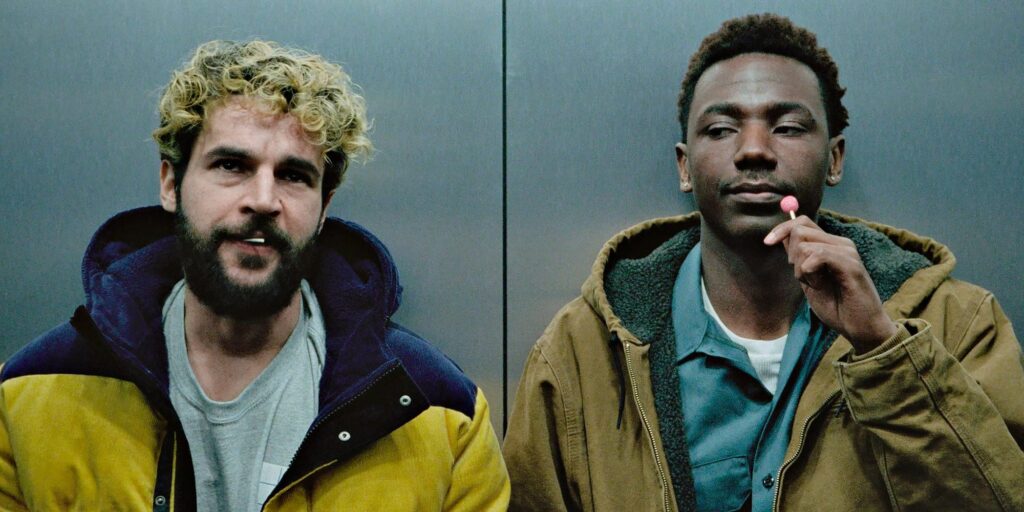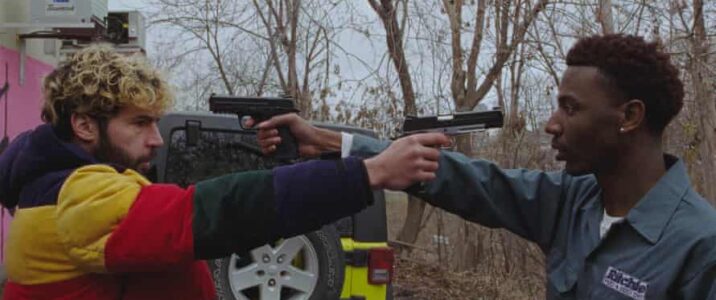For its first virtual edition, Alex is publishing an ongoing series of his high (and low) lights at this year’s Sundance Film Festival.
How far would you go for your best friend? When they ask you for a favor, no matter what it might be, would you follow through for them? Would you even die for them? These questions, particularly the last one, are the kind childhood chums Kevin (Christopher Abbott) and Val (Jerrod Carmichael) contend with in Carmichael’s directorial debut On the Count of Three.
Perhaps I should offer some context. It all starts on a typical morning with miserable Val heading to his dead-end job digging up mulch. He is summoned to his supervisor’s office and is offered a promotion to floor manager. Val takes the news by heading to the bathroom stall where he unsuccessfully attempts to hang himself with his own belt.
Following his unsuccessful suicide attempt, Val figures he needs some help. And who better to aid him in this desperate hour than his old buddy, Kevin? But Val is not seeking any counseling or therapeutic advice. If anything, he offers a proposition to Kevin that maybe they could engage in a murder/suicide pact. After all, Kevin tried killing himself just three days earlier while staying in a mental hospital, so Val is practically doing him a favor. Before they carry through with the deed (in front of a strip club, of all places), the two decide to spend their last day on earth doing whatever they feel like before fulfilling their morbid pact.
They have fun reenacting their childhood memories like DMX bike riding but dedicate their final day primarily to face their traumas. Val must confront his abusive father (J.B. Smoove), as well as the girlfriend (Tiffany Haddish) he’s neglected calling in over a week. Meanwhile, Kevin decides to spend his final hours enacting revenge on the psychiatrist (Henry Winkler) who sexually took advantage of him.

There are twists the plot takes, none of which I will disclose, but I could tell from early on the film’s pros and cons. Abbot and Carmichael share a believable chemistry, as well as make valiant efforts to elevate Ari Katcher and Ryan Welch’s script. Carmichael’s sad-faced persona and monotonous tone of voice occasionally comes across as overly flat, but there is a spark of life in him once he begins to doubt wanting to carry through with his plan. Abbot gives it his all as a man whose lifelong history of mental illness exacerbated by abuse prompts him to lash out with volcanic rage when he is not channeling his anger through the heavy metal music he listens to incessantly. The two leads carry the film on their shoulders, and they alone are nearly worth the price of admission.
Unfortunately, all the other characters come across as one-note, a decision which might be designed to accentuate Val and Kevin’s feelings of isolation. Yet it’s one that comes across as cloying and gimmicky, apart from Haddish, who lends a credible mix of love and no-nonsense exasperation to an otherwise thankless role.
The screenplay also wishes to accuse society’s negligence towards minorities and people with mental disorders as playing a role in our heroes’ current state, but it comes across like a stern lecturer, particularly in a misconceived scene involving an encounter with an apathetic cashier. The final shot, which emphasizes the high amount of incarcerated black men in America, feels underdeveloped and ultimately comes across as jarring. Although Carmichael makes a valiant effort to candidly discuss heavy subject matter with doses of dark humor, maybe he will be able to gather his topics together more cohesively in his sophomore feature.
